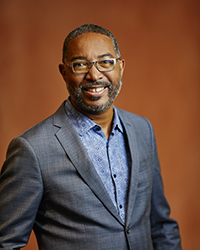Stating the Case for Police Reform
Professor Frank Rudy Cooper seeks to help the Nevada Legislature identify ways to substantively improve policing practices

By Paul Szydelko
As the only law school in Nevada, the UNLV William S. Boyd School of Law is uniquely positioned not only to be a dynamic resource for the state Legislature but to have a profound impact by helping to research, draft, and advocate for new laws.
William S. Boyd Professor Frank Rudy Cooper took full advantage of that position during this year’s legislative session, lending his expertise to lawmakers when the discussion turned to the highly contentious topic of police reform.
Cooper, who helps lead the law school’s Race, Gender & Policing Program, applauds two relatively modest but important reform bills passed by the 2021 Legislature. One bill allows the attorney general to investigate patterns and practices of unconstitutional or unequal enforcement, and the other makes it more difficult for police to obtain “no-knock warrants.”
As much as those new laws are a step in the right direction, Cooper notes that Nevada still has a lot of work to do on the issue of police reform. As an example, he points to Colorado, which last year passed a sweeping bill that requires all police officers to use body-worn cameras, bans chokeholds, and limits when officers can shoot at a person who is running away, among other new laws.
Cooper is especially interested in halting “pretextual stops,” which are permitted by law under Whren v. the United States. “Are there ways that the state can prevent police officers from using something like jaywalking to seize and search somebody because they suspect them of being a drug dealer or something else?”
Cooper and his Race, Gender & Policing Program colleagues—Assistant Director Addie Rolnick, co-facilitator Stewart Chang, Eve Hanan, and Dmitri Shalin—hope state lawmakers will soon address several other police-reform issues. They are researching the value of creating a more robust civilian review of police departments and exploring the legality of qualified immunity, which shields police officers from being held liable for violating a person’s civil rights.
At the grassroots level, Cooper is hoping to involve more students in researching race, gender, sexual orientation, economic status, and other identity issues that often impede fair and bias-free policing.
One way to increase that involvement is to introduce students to the subject early in their law school journey. UNLV Boyd Law is now doing that through a mandatory class for 1Ls called “Law and Inequality: Policing, Protest, and Reform.” The course, which became part of the curriculum in the Fall 2020 semester, was well received after some initial concerns, Cooper says.
“A particular subset of students was worried they were going to be maligned if they didn’t agree with some of the critiques of policing,” says Cooper, adding that the class didn’t require students to have particular views on the topic. The vast majority of students evaluated the class positively.
Cooper himself advocates for what he calls a “right-size policing” paradigm.
“What the police ought to be doing, and I think most of them are trying to do, is to get involved when there’s a major crime that requires somebody to step in and intervene, but not to over-police those communities,” he says. “This is particularly important for communities of color and lower-income communities.”
To that point, Cooper says he’s encouraged by the Las Vegas Metropolitan Police Department’s work on de-escalation and the use-of-force continuum. He adds that the organization has displayed an openness to reform and is moving toward more progressive policing practices.
“After some criticism, [Metro has] been pretty proactive in trying to make some reforms even before they were pressured to do so,” Cooper says. “Hopefully that trend continues—and hopefully the Legislature encourages that.”